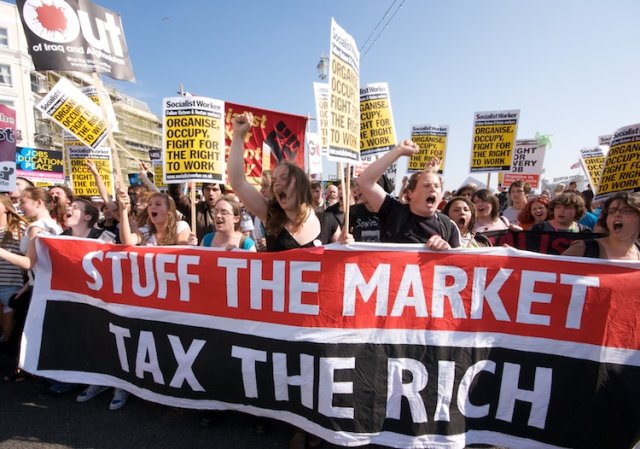
As the May federal budget approaches, Labor PM Julia Gillard and opposition leader Tony Abbott have gone on a welfare-recipient bashing spree. Exploiting the well-worn and reactionary “dole bludger” stereotype, they are softening us up for budget cuts to welfare and other social services.
But this sadly predictable spectacle is not washing with most people, according to the findings of an April 11 Essential Report survey.
Most said they want taxes raised for big corporations (63%) and tax breaks for high income earners removed (51%). The poll said a small minority (21%) support cuts to unemployment and disability benefits. More (32%) would prefer the military budget to be cut first.
If we had a “people’s budget” in this country — one that reflects the wishes of the majority today — it would tax the big companies that are raking in massive profits.
Instead, we have a Labor government taking aim at the poorest and most disadvantaged people in our society and threatening to cut the relatively small funds ($400 million) allocated to medical research.
Thousands of medical research workers, patients and other supporters rallied around the country on April 12 against cuts to this often life-saving research.
Some of the protesters in the Sydney rally had placards that contrasted the tiny amount of federal money spent on medical research with the massive $32 billion spent each year on the military. That’s about $87 million a day!
In 2008-09, the federal government spent $17.2 billion on subsidies and tax breaks to business, according to estimates by the Productivity Commission. A lot of this went to boosting the profits of environmentally and socially destructive corporations such as coal and car companies.
Giant mining companies are raking in billions of dollars of profit from the current mining boom, which is the biggest in Australian history.
But the Gillard Labor government gave away an estimated $60 billion in taxes on mining company super profits over the next ten years through its backdown on the mining super profits tax proposed by the previous Rudd Labor government.
As mining profits have spiralled upwards, the share of these profits paid in tax and royalties in Australia has fallen by more than a third of what it was in 1999 according to Treasury calculations published in May 2010.
It is no wonder that Australia’s richest man and richest woman are mining billionaires Andrew “Twiggy” Forrest and Gina Rhinehart.

There is a growing public understanding that we have been cheated by Labor and Coalition governments that have slavishly served the rich minority and helped them get even richer.
Just two years after people around the world watched trillions of dollars of public funds being used to bail out big banks, which were nearly brought down because of their own greedy and speculative behaviour — they have seen the CEOs of the same banks reward themselves with massive pay increases and bonuses.
Imagine the uproar if a government dared to follow the wishes of the majority and started seriously taxing the profits of the big companies and the billionaires.
The politicians of the rich minority would call it “unAustralian”, “subversive” and “extremist”.
The big business media would drop their feigned support for democracy and bay for blood. And the rich will threaten to take “their” capital and run.
But it is not “theirs” to take and run.
The disgusting sight of Labor and Coalition governments attacking the already miserable entitlements of the unemployed and people on disability pensions, while boosting the profits of the corporate rich through tax cuts, subsidies and by keeping their workers' wages down, is only a small part of the robbery.
The wealth of the rich is not the fruit of their own hard work but the result of a systematic appropriation of the wealth created by the work of others, by paying the workers they employ less than the value of what they produce.
This is the day-in, day-out theft carried out under capitalism. The rich get their wealth by exploiting others and by robbing the Earth, then use these same ill-gotten gains to exploit even more people and further vandalise the environment.
Today, the polls show that most Australians think the corporate rich are not paying their share. But one day a majority will understand that the elite’s obscene wealth is not theirs at all and will organise to take it back.
Comments
Anonymous replied on Permalink
Anonymous replied on Permalink
Anonymous replied on Permalink